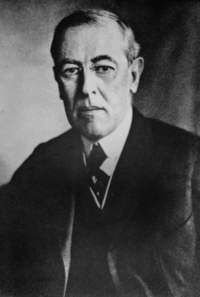
| Armeniërs zonder land of een land zonder Armeniërs. De Belgische houding in de Volkenbond over de Armeense kwestie, 1919-1928. (Sita Vreeling) |
| home | lijst scripties | inhoud | vorige | volgende |
Bijlage
Fragmenten uit het Verdrag van Sèvres, ondertekend op 10 augustus 1920.
Uit: Traité de Sèvres entre les Puissances alliées et la Turquie signé le 10 août 1920. Londen, 1920.
SECTION VI.
ARMENIA.
ARTICLE 88.
Turkey, in accordance with the action already taken by the Allied Powers, hereby recognises Armenia as a free and independent State.
ARTICLE 89.
Turkey and Armenia as well as the other High Contracting Parties agree to submit to the arbitration of the President of the United States of America the question of the frontier to be fixed between Turkey and Armenia in the vilayets of Erzerum, Trebizond, Van and Bitlis, and to accept his decision thereupon, as well as any stipulations he may prescribe as to access for Armenia to the sea, and as to the demilitarisation of any portion of Turkish territory adjacent to the said frontier.
ARTICLE 90.
In the event of the determination of the frontier under Article 89 involving the transfer of the whole or any part of the territory of the said Vilayets to Armenia, Turkey hereby renounces as from the date of such decision all rights and title over the territory so transferred. The provisions of the present Treaty applicable to territory detached from Turkey shall thereupon become applicable to the said territory.
The proportion and nature of the financial obligations of Turkey which Armenia will have to assume, or of the rights which will pass to her, on account of the transfer of the said territory will be determined in accordance with Articles 241 to 244, Part VIII (Financial Clauses) of the present Treaty.
Subsequent agreements will, if necessary, decide all questions which are not decided by the present Treaty and which may arise in consequence of the transfer of the said territory.
ARTICLE 91.
In the event of any portion of the territory referred to in Article 89 being transferred to Armenia, a Boundary Commission, whose composition will be determined subsequently, will be constituted within three months from the delivery of the decision referred to in the said Article to trace on the spot the frontier between Armenia and Turkey as established by such decision.
ARTICLE 92.
The frontiers between Armenia and Azerbaijan and Georgia respectively will be determined by direct agreement between the States concerned.
If in either case the States concerned have failed to determine the frontier by agreement at the date of the decision referred to in Article 89, the frontier line in question will be determined by the Pricipal Allied Powers, who will also provide for its being traced on the spot.
ARTICLE 93.
Armenia accepts and agrees to embody in a Treaty with the Principal Allied Powers such provisions as may be deemed necessary by these Powers to protect the interests of inhabitants of that State who differ from the majority of the population in race, language, or religion.
Armenia further accepts and agrees to embody in a Treaty with the Principal Allied Powers such provisions as these Powers may deem necessary to protect freedom of transit and equitable treatment for the commerce of other nations
PART IV.
PROTECTION OF MINORITIES.
ARTICLE 140.
Turkey undertakes that the stipulations contained in Articles 141, I45 and I47 shall be recognised as fundamental laws, and that no civil or military law or regulation, no Imperial Iradeh nor official action shall conflict or interfere with these stipulations, nor shall any law, regulation, Imperial Iradeh nor official action prevail over them.
ARTICLE 141.
Turkey undertakes to assure full and complete protection of life and liberty to all inhabitants of Turkey without distinction of birth, nationality, language, race or religion. All inhabitants of Turkey shall be entitled to the free exercise, whether public or private, of any creed, religion or belief.
The penalties for any interference with the free exercise of the right referred to in the preceding paragraph shall be the same whatever may be the creed concerned.
ARTICLE 142.
Whereas, in view of the terrorist regime which has existed in Turkey since November 1, 1914, conversions to Islam could not take place under normal conditions, no conversions since that date are recognised and all persons who were non-Moslems before November 1, 1914, will be considered as still remaining such, unless, after regaining their liberty, they voluntarily perform the necessary formalities for embracing the Islamic faith.
In order to repair so far as possible the wrongs inflicted on individuals in the course of the massacres perpetrated in Turkey during the war, the Turkish Government undertakes to afford all the assistance in its power or in that of the Turkish authorities in the search for and deliverance of all persons, of whatever race or religion, who have disappeared, been carried off, interned or placed in captivity since November 1, 1914.
The Turkish Government undertakes to facilitate the operations of mixed commissions appointed by the Council of the League of Nations to receive the complaints of the victims themselves, their families or their relations, to make the necessary enquiries, and to order the liberation of the persons in question.
The Turkish Government undertakes to ensure the execution
of the decisions of these commissions, and to assure the security and the liberty of the persons thus restored to the full enjoyment of their rights.
ARTICLE 143.
Turkey undertakes to recognise such provisions as the Allied Powers may consider opportune with respect to the reciprocal and voluntary emigration of persons belonging to racial minorities.
Turkey renounces any right to avail herself of the provisions of Article I6 of the Convention between Greece and Bulgaria relating to reciprocal emigration, signed at Neuilly-sur-Seine on November 27, 19l9. Within six months from the coming into force of the present Treaty, Greece and Turkey will enter into a special arrangement relating to the reciprocal and voluntary emigration of the populations of Turkish and Greek race in the territories transferred to Greece and remaining Turkish respectively.
In case agreement cannot be reached as to such arrangement, Greece and Turkey will be entitled to apply to the Council of the League of Nations, which will fix the terms of such arrangement.
ARTICLE 144.
The Turkish Government recognises the injustice of the law of 1915 relating to Abandoned Properties (Emval-i-Metroukeh), and of the supplementary provisions thereof, and declares them to be null and void, in the past as in the future.
The Turkish Government solemnly undertakes to facilitate to the greatest possible extent the return to their homes and re-establishment in their businesses of the Turkish subjects of non-Turkish race who have been forcibly driven from their homes by fear of massacre or any other form of pressure since January 1, 1914. It recognises that any immovable or movable property of the said Turkish subjects or of the communities to which they belong, which can be recovered, must be restored to them as soon as possible, in whatever hands it may be found. Such property shall be restored free of all charges or servitudes with which it may have been burdened and without compensation of any kind to the present owners or occupiers, subject to any action which they may be able to bring against the persons from whom they derived title.
The Turkish Government agrees that arbitral commissions shall be appointed by the Council of the League of Nations wherever found necessary. These commissions shall each be composed of one representative of the Turkish Government, one representative of the community which claims that it or one of its members has been injured, and a ehairman appointed by the Council of the League of Nations. These arbitral commissions shall hear all claims covered by this Article and decide them by summary procedure.
The arbitral commissions will have power to order:
(1) The provision by the Turkish Government of labour for any work of reconstruction or restoration deemed necessary. This labour shall be recruited from the races inhabiting the territory where the arbitral commission considers the execution of the said works to be necessary
(2) The removal of any person who, after enquiry, shall be recognised as having taken an active part in massacres or deportations or as having provoked them; the measures to be taken with regard to such person's possessions will be indicated by the commission;
(3) The disposal of property belonging to members of a community who have died or disappeared since January 1, 1914, without leaving heirs; such property may be handed over to the community instead of to the State
(4) The cancellation of all acts of sale or any acts creating rights over immovable property concluded after January 1, I914. The indemnification of the holders will be a charge upon the Turkish Government, but must not serve as a pretext for delaying the restitution. The arbitral commission will, however have the power to impose equitable arrangements between the interested parties, if any sum has been paid by the present holder of such property.
The Turkish Government undertakes to facilitate in the fullest possible measure the work of the commissions and to ensure the execution of their decisions, which will be final. No decision of the Turkish judicial or administrative authorities shall prevail over such decisions.
ARTICLE 145.
All Turkish nationals shall be equal before the law and shall enjoy the same civil and political rights without distinction as to race, language or religion.
Difference of religion, creed or confession shall not prejudice any Turkish national in matters relating to the enjoyment of civil or political rights, as for instance admission to public employments, functions and honours, or the exercise of professions and industries.
Within a period of two years from the coming into force of the present Treaty the Turkish Government will submit to the Allied Powers a scheme for the organisation of an electoral system based on the principle of proportional representation of racial minorities.
No restriction shall be imposed on the free use by any Turkish national of any language in private intercourse, in commerce, religion, in the press or in publications of any kind, or at public meetings. Adequate facilities shall be given to Turkish nationals of non-Turkish speech for the use of their language, either orally or in writing, before the courts.
ARTICLE 146.
The Turkish Government undertakes to recognize the validity of diplomas granted by recognised foreign universities and schools, and to admit the holders thereof to the free exercise of the professions and industries for which such diplomas qualify.
This provision will apply equally to nationals of Allied powers who are resident in Turkey.
ARTICLE 147.
Turkish nationals who belong to racial, religious or linguistic minorities shall enjoy the ame treatment and security in law and in fact as other Turkish nationals. In particular they shall have an equal right to establish, manage and control at their own expense, and independently of and without interference by the Turkish authorities, any charitable, religious and social institutions, schools for primary, secondary and higher instruction and other educational establishments, with the right to use their own language and to exercise their own religion freely therein.
ARTICLE 148.
In towns and districts where there is a considerable proportion of Turkish nationals belonging to racial, linguistic or religious minorities, these minorities shall be assured an equitable share in the enjoyment and application of the sums which may be provided out of public funds under the State, municipal or other budgets for educational or charitable purposes.
The sums in question shall be paid to the qualified representatives of the communities concerned.
ARTICLE 149.
The Turkish Government undertakes to recognise and respect the ecclesiastical and scholastic autonomy of all racial minorities in Turkey. For this purpose, and subject to any provisions to the contrary in the present Treaty, the Turkish Government confirms and will uphold in their entirety the prerogatives and immunities of an ecclesiastical, scholastic or judicial nature granted by the Sultans to non-Moslem races in virtue of special orders or imperial decrees (firmans, hattis, berats, etc.) as well as by ministerial orders or orders of the Grand Vizier.
All laws, decrees, regulations and circulars issued by the Turkish Government and containing abrogations, restrictions or amendments of such prerogatives and immunities shall be considered to such extent null and void.
Any modification of the Turkish judical system which may be introduced in accordance with the provisions of the present Treaty shall be held to override this Article, in so far as such modification may affect individuals belonging to racial minorities.
ARTICLE 150.
In towns and districts where there is resident a considerable proportion of Turkish nationals of the Christian or Jewish religions the Turkish Government undertakes that such Turkish nationals shall not be compelled to perform any act which constitutes a violation of their faith or religious observances, and shall not be placed under any disability by reason of their refusal to attend courts of law or to perform any legal business on their weekly day of rest. This provision, however, shall not exempt such Turkish nationals (Christians or Jews) from such obligations as shall be imposed upon all other Turkish nationals for the preservation of public order.
ARTICLE 151.
The Principal Allied Powers, in consultation with the Council of the League of Nations, will decide what measures are necessary to guarantee the execution of the provisions of this Part. The Turkish Government hereby accepts all decisions which may be taken on this subject.
Fragment uit het Verdrag van Kars, ondertekend op 23 oktober 1921.
(Vriendschapsverdrag tussen Turkije, de Socialistische Sovjet Repbliek van Armenië, Azerbeidzjan en Georgië)
Uit: Groong (the Armenian News Network), 1988. (http://groong.usc.edu).
Article I
The Government of the Grand National Assembly of Turkey and the Governments of the Socialist Soviet Republics of Armenia, Azerbaijan, and Georgia consider as null and void the treaties concluded between the Governments which have previously exercised sovereign rights over territory actually forming part of the territory of the Contracting Parties and concerning the above-mentioned territories, as well as the treaties concluded with third states concerning the Transcaucaucasus Republics. It is understood that the Turkish-Russian Treaty signed in Moscow on March 16, 1921 (1337) will be exempted from the terms of this Article.
Article II
The Contracting Parties agree not to recognize any treaty of peace or other international act imposed upon one any of them against its will. In virtue of this agreement, the Governments of the Socialist Soviet Republics of Armenia, Azerbaijan and Georgia agree not to recognize any international act concerning Turkey which has not been recognized by the National Government of Turkey, actually represented by its Grand National Assembly. (By the term Turkey is meant, in the present Treaty, the territories included in the Turkish National Pact of January 28, 1920 (1336), developed and proclaimed by the Ottoman Chamber of Deputies in Constantinople and communicated to the press and to all States). For its part, the Government of the Grand National Assembly of Turkey agrees not to recognize any international act concerning Armenia, Azerbaijan, and Georgia that may not be by the respective Governments of these countries, actually represented by the Soviets of Armenia, Azerbaijan, and Georgia.
Article III
The Governments of the Socialist Soviet Republics of Armenia, Azerbaijan and Georgia, recognizing that the system of capitulations is incompatible with the free life of the national development of all countries, as well as with the full exercise of sovereign rights, consider as null and abrogate the exercise, in Turkey, of all offices and rights included in this system.
Article IV
The northeast border of Turkey (according to the map of the Russian General Staff, on a scale of 1:210000.5 verstes to the inch) is determined by the line which, beginnin at the village of Sarp on the black Sea, passes by the Mt. Khedis Mga, the watershed line of at Mt. Shavshet- Mount Kana Dagh; from there, it always follows the former northern administrative borders of the sanjaks of Ardahan and Kars, the thalweg of the Arpachai River and that of the Arax as far as the mouth of the Nijni Kara Su river. (For details of the border and questions pertaining to it, see Annexes I and II and the map inclosed, signed by the two Contracting Parties. In the event of discrepancies between the text of the Treaty and the Map, the text of the treaty shall prevail over the map).
A mixed commission of delimitation, comprised of equal number of members, with the participation of a representative of the RSFSR, is directed to determine in detail and to establish the actual border of the state, and to erecte boundary markers. (Annex IV: the map). [not reproduced]
Article V
The Turkish Government and the Soviet Governments of Armenia and Azerbaijan are agreed that the region of Nakhichevan, within the limits specified by Annex III to the present Treaty, constitutes an autonomous territory under the protection of Azerbaijan.
Article VI
Turkey agrees to cede to Georgia suzerainty over the town and port of Batum, with the territory to the north of the frontier, indicated in Article IV of the present Treaty, which formed part of the district of Batum, on condition:
1. That the population of the localities specified in the present Article shall enjoy a greater measure of local administrative autonomy, that each community is guaranteed its cultural and religious rights, and that this population may introduce in the above-mentioned places an agrarian system in conformity with its own wishes.
2. That Turkey be assured free transit through the port of Batum for commodities and all materials destined for, or originating in, Turkey, without customs duties and charges, and with the right for Turkey to utilize the port of Batum without special charges. For the application of this Article, a commission of representatives of the interested Parties shall be created immediately after the signing of the present Treaty.
Article VII
The Government of the Grand National Assembly of Turkey and the Government of SSRG agree to facilitate the crossing of the border by the inhabitants of the bordering zones, on condition of the observance of the customs, police, and sanitary regulations which shall be established in this regard by a mixed commission.
Article VIII
The Government of the Grand National Assembly of Turkey and and the Government of SSRG consider that it is necessary for the inhabitants of the bordering districts of two countries to make use of summer and winter pastures on the other side of the border, and agree to accord to these inhabitants the right to cross the border with their animals and to avail themselves of the customary pasturage. Customs formalities, and police, sanitary, and other measures applying to border crossings shall be determined by a mixed commission.
Article IX
With the view to assuring the opening and free passage through the Straits for the commerce of all peoples, Turkey and Georgia agree to submit the definitive elaboration of the international regulations for the black Sea and the Straits to a subsequent conference composed of delegates from the littoral states, unless the decisions there reached encroach upon the sovereignty and security of Turkey and of Constantinople, its capital.
Article X
The Contracting Parties agree not to admit upon their territories the formation or sojourn of organizations or groups pretending to assume the role of government of the other country or a part of its territory, nor the sojourn of groups having for their purpose war against the other country. It is clearly understood that the Turkish territory mentioned above in the present Article is the territory under the direct civil and military administration of the Grand National Assembly of Turkey.
Article XI
Nationals of each of the two Contracting Parties, residing in the territory of the other Party, shall be treated in accordance with the duties and obligations decreed by the laws of the country in which they reside, with the exception of those concerning the national defense, from which they shall be exempt. Questions of family right, inheritance, and legal capacity are also excepted in the present Article, and shall be settled by a special agreement.
Article XII
The Contracting Parties will apply the most favored nation rule to nationals of one of the Contracting Parties residing in the territory of the other. This Article does not affect the rights accorded reciprocally by the Soviet Republics to citizens of allied Soviet Republics on their territory, as well as to the rights accorded by Turkey to nationals of the Moslem states allied with Turkey.
Article XIII
All inhabitants of territory that was part of Russia before 1918, and over which the sovereignty of Turkey is affirmed, shall have the opportunity, if they desire to relinquish their Turkish nationality, to leave Turkey freely, taking with them their possessions and goods, or the proceeds of their sale. Likewise, all inhabitants of territory whose sovereignty has been ceded to Georgia by Turkey shall have the opportunity, if they desire to relinquish Georgian nationality, to leave the territory of Georgia freely, taking with them their possessions, goods, and capital.
The inhabitants mentioned in the above sentences shall be granted a deferment of one month from military service, beginning on the date on which they shall have signified in due form their intention of leaving the territories in question.
Article XIV
The Contracting Parties agree to conclude, within the period of six month from the signature of the present Treaty, special arrangements with regard to the refugees of the wars of 1918 and 1920.
Article XV
Each of the Contracting Parties agrees to promulgate, immediately after the signature of the present Treaty, a complete amnesty to citizens of the other Party for crimes and offenses committed during the course of the war on the Caucasian front.
Article XVI
The Contracting Parties agree to effect reciprocally, within the period of two months after the signature of the present Treaty, the repatriation of former military and civilian prisoners residing in the territory of one of the Contracting Parties.
Article XVII
In order to ensure the continuance of relations between their countries, the Contracting Parties agree to take, in a common agreement, all the measures necessary to maintain and develop as quickly as possible railway, telegraphic, and other communications, as well as to assure free transit of persons and commodities without any hindrance. It is understood, however, that the entry and departure of travelers and commodities will be governed by the full application of all the regulations established in this regard by each of the Contracting Parties.
Article XVIII
With a view to organizing commercial relations and regulating economic, financial, and other questions necessary to strengthen the friendly relations between the two countries, a commission of representatives from the interested countries shall convene at Tiflis immediately after the signature of the present Treaty.
Article XIX
The Contracting Parties agree to conclude consular conventions within the period of three months from the signature of the present Treaty.
Article XX
The present Treaty, concluded between the Governments of Turkey, Armenia, Azerbaijan, and Georgia, shall be subject to ratification. The exchange of ratifications shall take place at Yerevan within the shortest possible time.
The present Treaty shall enter into force immediately after the exchange of the acts of ratification, exception being made to Articles VI, XIV, XVI, XVIII, and XIX, which enter into force immediately after the signature of the Treaty.
ANNEX I
Northeast Frontier (follows verbatim Annex 1(a) of the Turkish-Russian Treaty of March 16, 1921)
The northeast border of Turkey is fixed as follows (according to the map of the Russian General Staff, on a scale of 1:210,000.5 verstes to the inch):
The village of Sari on the black Sea, Mt. Kara-Shalvar (5014), crosses Chorokh to the north from the village of Maradidi, passes to the north of Sabur, Mt. Khedis Mga (7052), Mt. Kva-Kibe, village of Kavtareli, line of watershed Medzibna Mountain and Mt. Great-Kessun (6468), follows the line of the watershed Mt. Korda (7910), goes along the western part of the ridge Shavshet to the administrative border of the former Artvin district, goes to the Mt. Sari Chai (Kara-Issal) (8478), summit of the mountain Kviral, then follows the administrative border of the former Ardahan district by Mt. Kana-Dagh, thence, turning to the north, goes to Mt. Tlil (Grmani) (8357), and following the former border of Ardahan, goes to the northeast of the village of Badela, to the river Poskov-Chai, and follows to the south aling this river to a point to the north of the village of Chap Chakh, then it leaves the river, follows the watershed to Mt. Airlian-Bashi, goes over the Mts. Kella-Tana (9709), reaches Mt. Kasris-Seri (9681), and follows along the river Karzamet Chai until it reaches the river Kura, thence it goes along the line of the watershed of Mt. Kara-Ogli (7259), whence, dividing in two parts Lake Khazapin, it goes to the elevation 7580, then to Mt. Geg-Dagh (9152), goes over Mt. Uch-Tapoylar (9783), and Mt. Taila-Kala (9716), ridge 9065, where it leaves the border of the former Ardahan district and passes over the Mts. B. Akh Barba (9963), 8828 (8827), 7602, goes to the east of the village of Ibish, reaches elevation 7518, and then Mt. Kizil Dash (7439) (7440), village of New Kizil-Dash (Kizel-Dash), passes to the west from the Karamemeda, goes to the river Jambushu Chai (which is to the east of the village of Delaver, B. Kikli, and Tikhnis), and through the village of Vartanli and Bashi-Shuragel; following the above-named river, it goes to the river Arpa Chai to the north of Kayalala, from there follows all the time the thalweg of the river Arpa Chai and arrives at the river Araxes, following its thalweg to the mouth of the river Lower Kara Su.
ANNEX II
Withdrawal of Troops in Arpa-Chai and Araxes Regions (follows verbatim Annex 1(b) of the Turkish-Russian Treaty of March 16, 1921)
Taking into consideration that the border line, as it is shown in Annex I, is the thalwegs of the rivers Arpa Chai and Araxes, the Government of the Grand National Assembly undertakes to remove the line of block-houses to the distance of 8 versts from the Alexandropol-Yerevan railway line in the district of the Arpa Chai river, and to the distance of 4 versts from the above-named railway in the district of the river Araxes. The lines which enclose the above-named districts are shown below: the district of the river Arpa Chai at sections (a) and (b) of Paragraph 1, and the district of the river Araxes in Paragraph 2.
Paragraph 1: District of the river Arpa Chai
(a) To the southeast from Vartanli, to the east from Uzun-Kilisa over Mt. Bozyar (5096), 5082-5047, to the east from Karmir-Vaik-Uch-Tapa (5578), to the east from Arzaz Oghlu, to the east from Ani, reaches Arpa Chai to the west from Yeni-Ki.
(b) Leaves Arpa Chai to the east from elevation 5019, goes straight to elevation 5481, at the distance of 4.5 versts, to the east from Kizil Kula at 2 versts, to the east from Bojali, and then the river Digor Chai, follows along this river to the village of Duz-Kechut, and goes straight to the north from the ruins of Karabat and to Arpa Chai.
Paragraph 2: District of the river Araxes
A straight line between Kharaba Alijan and the village of Suleiman (Diza).
In the districts bordered on one side by the line of the Alexandropol-Yerevan railway and on the other by the lines which are 8 and 4 versts from the above-named railway, the Government of the Grand National Assembly undertakes not to build any fortification and not to keep the regular army except the number which is essentially necessary for the maintenance of order and security. Those lines are not in the above-named districts.
ANNEX III
Territory of Nakhichevan
Village of Ourmia, from there by a straight line to the Azerdaian station (leaving it to SSRA), then by a straight line to Ms. Dash-Burun west (3142), watershed of Mt. Dash-Burun east (4108), crosses the river Kyahaanam-Darassi to the south of the inscription "Rodne" (Boulakh) (South), following the watershed of Mt. Bgarsik (6607) or (6587), and from there follows the administrative border of the former districts of Jerevan and of Sharur, Daralagyaz, by the elevation 6629 to the mountain Kemurlu Dagh (6839) or (6930), and from there to the elevation 3080, Sayat Dagh (7868), village Kurt Kulag (Kyurt Kulak), Mt. Gamessur Dagh (8160), elevation 8022, Kuri Dagh (10,181), and the eastern administrative border of the former district of Nakhichevan.
Fragment uit het Verdrag van Lausanne, ondertekend op 24 juli 1924.
Uit: The Treaties of Peace 1919-1923 (Carnegie Endowment for International Peace), Vol. II. New York, 1924.
SECTION III.
PROTECTION OF MINORITIES.
ARTICLE 37.
Turkey undertakes that the stipulations contained in Articles 38 to 44 shall be recognised as fundamental laws, and that no law, no regulation, nor official action shall conflict or interfere with these stipulations, nor shall any law, regulation, nor official action prevail over them.
ARTICLE 38.
The Turkish Government undertakes to assure full and complete protection of life and liberty to ali inhabitants of Turkey without distinction of birth, nationality, language, race or religion.
All inhabitants of Turkey shall be entitled to free exercise, whether in public or private, of any creed, religion or belief, the observance of which shall not be incompatible with public order and good morals.
Non-Moslem minorities will enjoy full freedom of movement and of emigration, subject to the measures applied, on the whole or on part of the territory, to all Turkish nationals, and which may be taken by the Turkish Government for national defence, or for the maintenance of public order.
ARTICLE 39.
Turkish nationals belonging to non-Moslem minorities will enjoy the same civil and political rights as Moslems.
All the inhabitants of Turkey, without distinction of religion, shall be equal before the law.
Differences of religion, creed or confession shall not prejudice any Turkish national in matters relating to the enjoyment of civil or political rights, as, for instance, admission to public employments, functions and honours, or the exercise of professions and industries.
No restrictions shall be imposed on the free use by any Turkish national of any language in private intercourse, in commerce, religion, in the press, or in publications of any kind or at public meetings.
Notwithstanding the existence of the official language, adequate facilities shall be given to Turkish nationals of non-Turkish speech for the oral use of their own language before the Courts.
ARTICLE 40.
Turkish nationals belonging to non-Moslem minorities shall enjoy the same treatment and security in law and in fact as other Turkish nationals. In particular, they shall have an equal right to establish, manage and control at their own expense, any charitable, religious and social institutions, any schools and other establishments for instruction and education, with the right to use their own language and to exercise their own religion freely therein.
ARTICLE 41.
As regards public instruction, the Turkish Government will grant in those towns and districts, where a considerable proportion of non-Moslem nationals are resident, adequate facilities for ensuring that in the primary schools the instruction shall be given to the children of such Turkish nationals through the medium of their own language. This provision will not prevent the Turkish Government from making the teaching of the Turkish language obligatory in the said schools.
In towns and districts where there is a considerable proportion of Turkish nationals belonging to non-Moslem minorities, these minorities shall be assured an equitable share in the enjoyment and application of the sums which may be provided out of public funds under the State, municipal or other budgets for educational, religious, or charitable purposes.
The sums in question shall be paid to the qualified representatives of the establishments and institutions concerned.
ARTICLE 42.
The Turkish Government undertakes to take, as regards non-Moslem minorities, in so far as concerns their family law or personal status, measures permitting the settlement of these questions in accordance with the customs of those minorities.
These measures will be elaborated by special Commissions composed of representatives of the Turkish Government and of representatives of each of the minorities concerned in equal number. In case of divergence, the Turkish Government and the Council of the League of Nations will appoint in agreement an umpire chosen from amongst European lawyers.
The Turkish Government undertakes to grant full protection to the churches, synagogues, cemeteries, and other religious establishments of the above-mentioned minorities. All facilities and authorisation will be granted to the pious foundations, and to the religious and charitable institutions of the said minorities at present existing in Turkey, and the Turkish Government will not refuse, for the formation of new religious and charitable institu- tions, any of the necessary facilities which are guaranteed to other private institutions of that nature.
ARTICLE 43.
Turkish nationals belonging to non-Moslem minorities shall not be compelled to perform any act which constitutes a violation of their faith or religious observances, and shall not be placed under any disability by reason of their refusal to attend Courts of Law or to perform any legal business on their weekly day of rest.
This provision, however, shall not exempt such Turkish nationals from such obligations as shall be imposed upon all other Turkish nationals for the preservation of public order.
ARTICLE 44.
Turkey agrees that, in so far as the preceding Articles of this Section affect non-Moslem nationals of Turkey, these provisions constitute obligations of international concern and shall be placed under the guarantee of the League of Nations. They shall not be modified without the assent of the majority of the Council of the League of Nations. The British Empire, France, Italy and Japan hereby agree not to withhold their assent to any modification in these Articles which is in due form assented to by a majority of the Council of the League of Nations.
Turkey agrees that any Member of the Council of the League of Nations shall have the right to bring to the attention of the Council any infraction or danger of infraction of any of these obligations, and that the Council may thereupon take such action and give such directions as it may deem proper and effective in the circumstances.
Turkey further agrees that any difference of opinion as to questions of law or of fact arising out of these Articles between the Turkish Government and any one of the other Signatory Powers or any other Power, a member of the Council of the League of Nations, shall be held to be a dispute of an international character under Article 14 of the Covenant of the League of Nations. The Turkish Government hereby consents that any such dispute shall, if the other party thereto demands, be referred to the Permanent Court of International Justice. The decision of the Permanent Court shall be final and shall have the same force and effect as an award under Article 13 of the Covenant.
ARTICLE 45.
The rights conferred by the provisions of the present Section on the non-Moslem minorities of Turkey will be similarly conferred by Greece on the Moslem minority in her territory.
Nansen Paspoort
Uit: B.: D.A.: refugiés russes 12178: Project over het invoeren van een identiteitskaart voor de Armeense vluchtelingen. 28 september 1923.
Overheid die het certificaat levert plaats van uitgifte nummer en datum
Identiteitskaart
Naam: Geldig tot (maximum twee jaar)
Voornaam:
Geboortedatum:
Geboorteplaats:
Naam van de vader:
Naam van de moeder:
Van origine Armeniër:
Beroep:
Vroegere verblijfsplaats:
Huidige verblijfsplaats:
Signalement:
Leeftijd:
Haar:
Ogen:
Gezicht:
Neus:
Speciale kenmerken:
Opmerkingen Foto en handtekening
Het huidige certificaat is niet geldig om terug te keren in het land dat dit heeft uitgegeven, zonder speciale toestemming. Dit houdt op te bestaan wanneer de houder het Turkse grondgebied betreedt.
Speciale toestemming om terug te kunnen keren:
De ondertekenende erkent dat de foto en de handtekening diegene zijn van de kaarthouder
Handtekening overheid:
Dit certificaat is een plan van dokter Nansen, Hoge Commissaris van de Volkenbond voor de vluchtelingen, 21 mei 1924, voor de geïnteresseerde regeringen.
Foto’s uit het Volkenbondarchief
Uit: League of Nations - Photo Archive, 2002. (http://www.indiana.edu/~league/).

Woodrow Wilson

Sir James Eric Drummond

Lord Robert Cecil
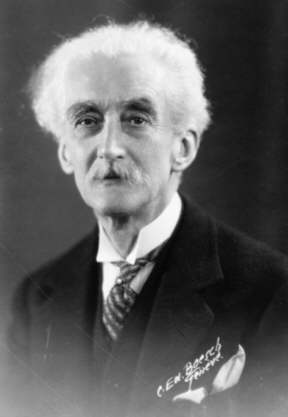
Paul Hymans
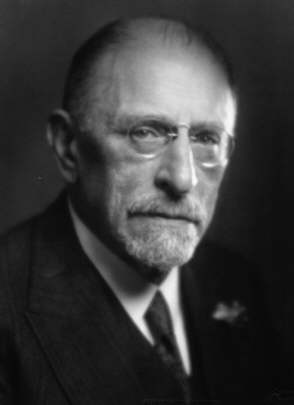
Sir Henri Morgenthau
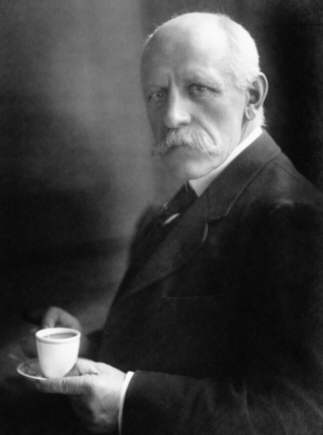
Dokter Fridtjof Nansen
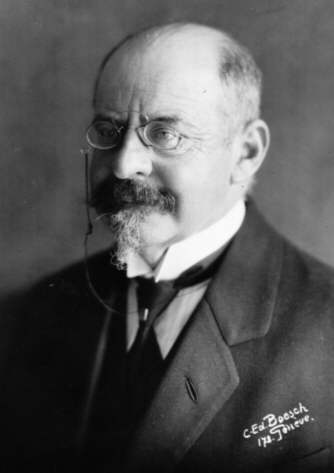
Emile Vandervelde
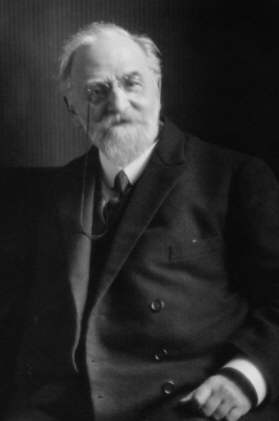
Leon Bourgeois
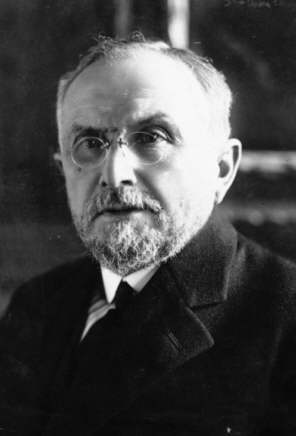
Gabriel Hanotaux
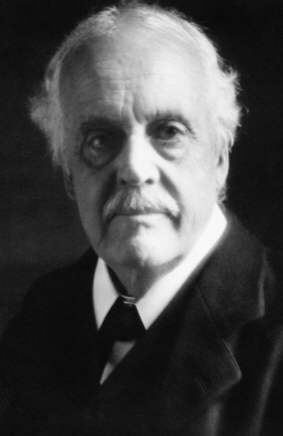
Lord Arthur James Balfour
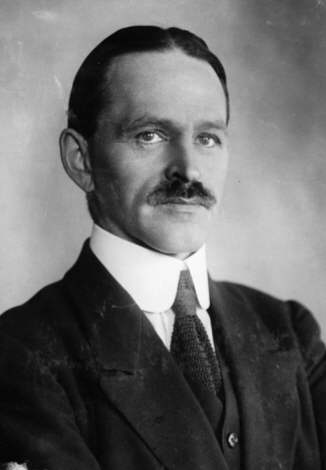
Eric Colban
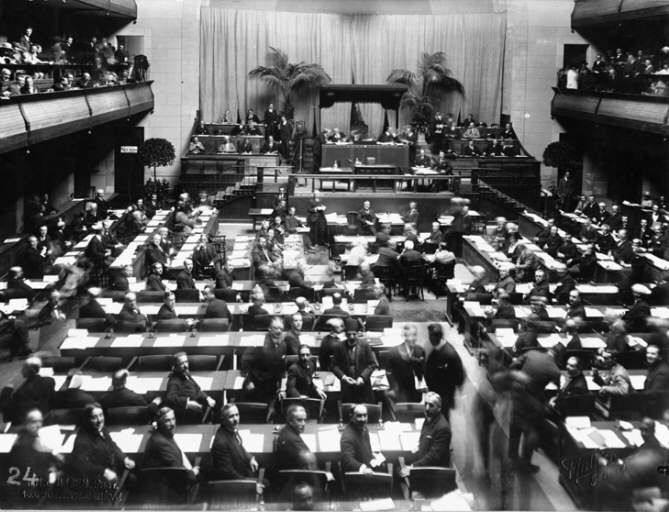
De Eerste Vergadering van de Volkenbond, 1920
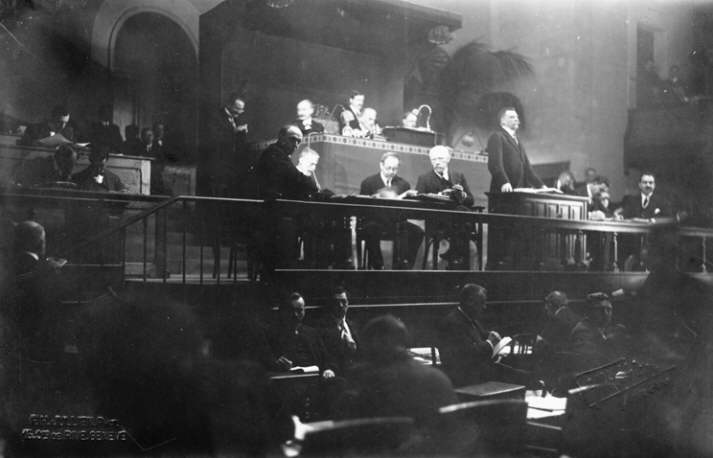
De Eerste Vergadering van de Volkenbond, 1920
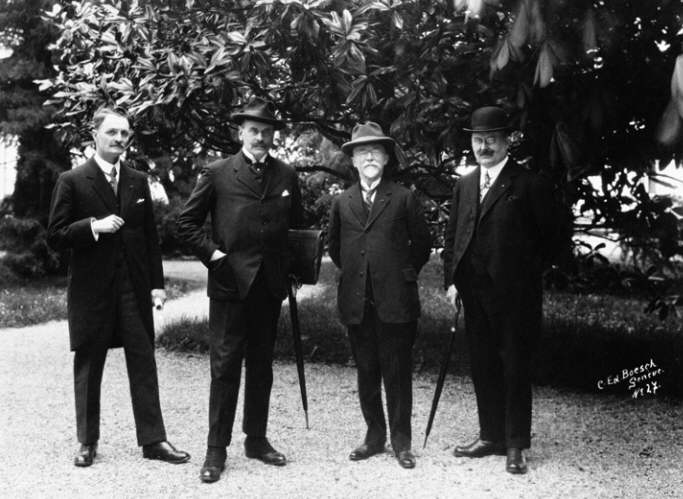
De Belgische delegatie in de Volkenbond
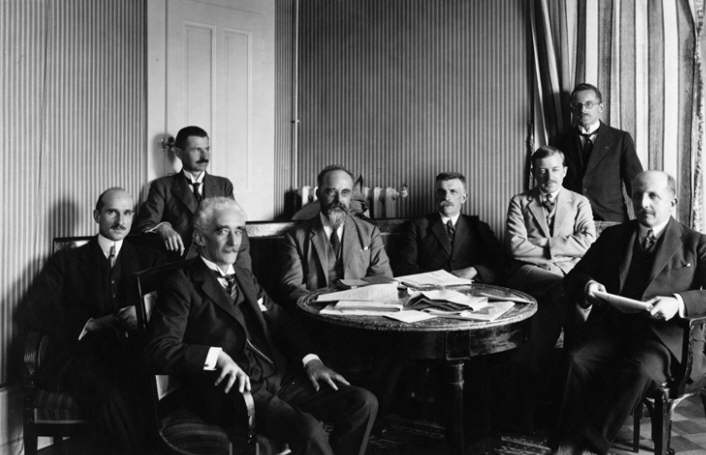
De Belgische delegatie in de Volkenbond
Kaarten
Kaart I: A la veille de la Première Guerre mondiale
Uit: MUSTAFIAN, C. Atlas historique de l'Arménie. Parijs, 2001, 69.
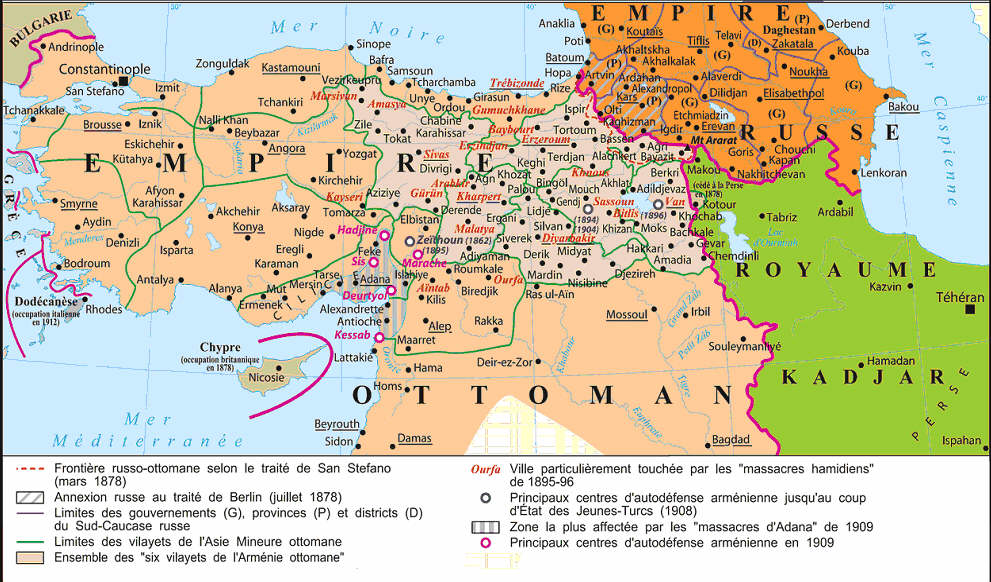
Kaart II: Les trois Arménies du XXe siècle
Uit: Le génocide arménien, crime imprescriptible, s.d. (http://www.imprescriptible.fr).
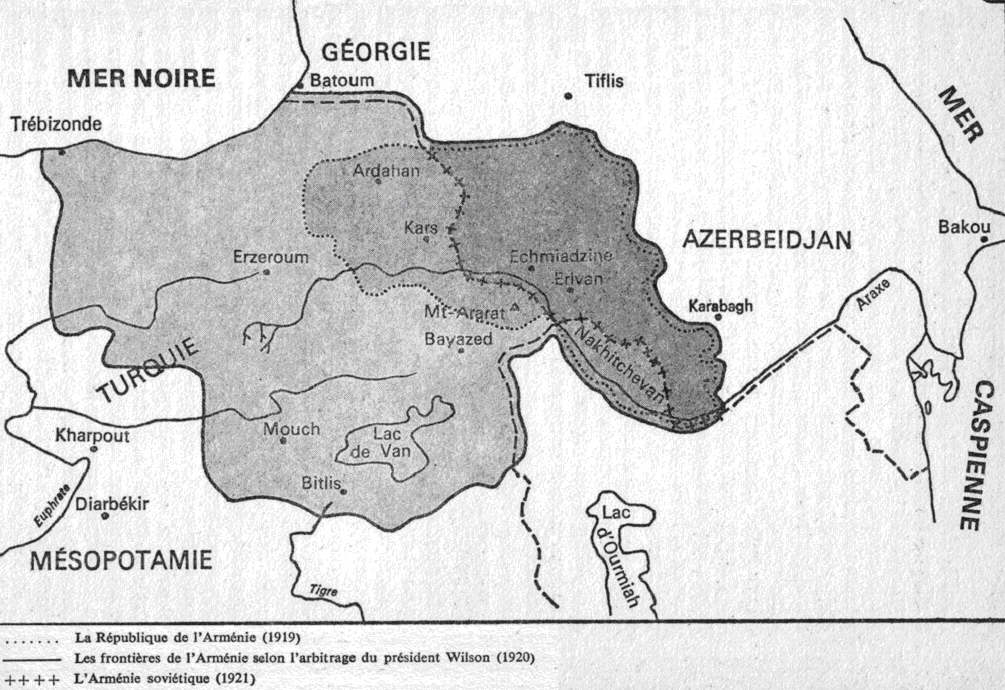
Kaart III: Le peuplement arménien à la veille du génocide (1915)
Uit: Le génocide arménien, crime imprescriptible, s.d. (http://www.imprescriptible.fr).
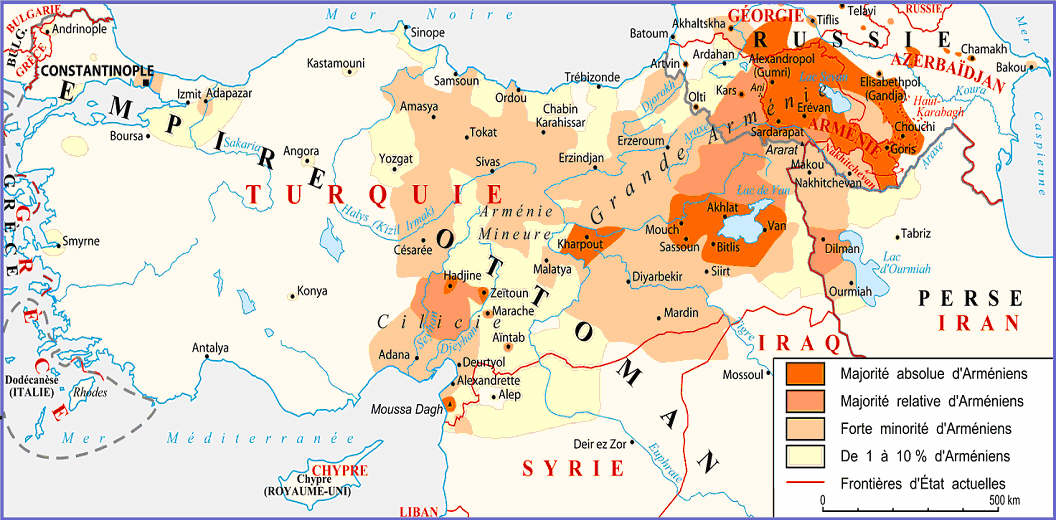
Kaart IV: Evolutions des frontières arméniennes
Uit: Le génocide arménien, crime imprescriptible, s.d. (http://www.imprescriptible.fr).
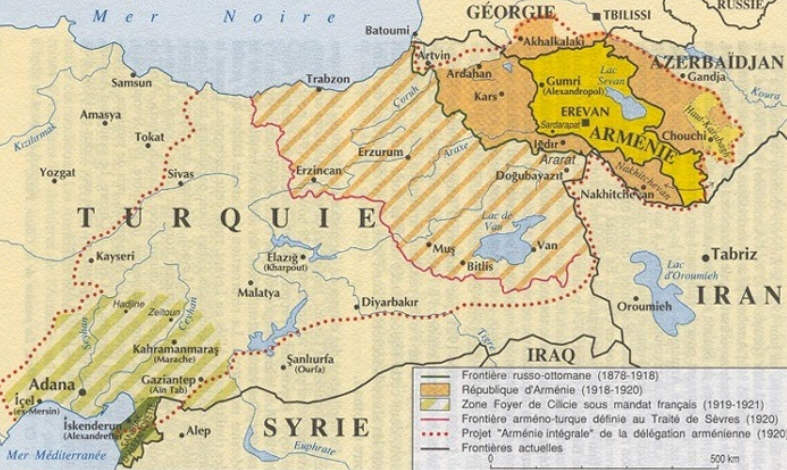
| home | lijst scripties | inhoud | vorige | volgende |